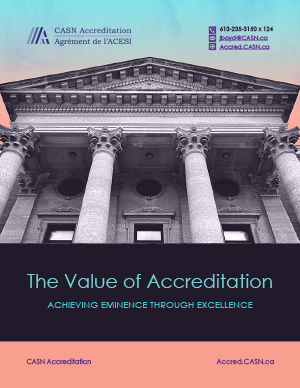 Achieving Eminence through Excellence
Achieving Eminence through ExcellenceWith over 130 schools of nursing in Canada offering entry-to-practice pre-licensure education, increased government demands for student admissions, and higher nursing student enrollment than ever recorded, formal recognition that your program meets national standards of excellence is paramount.
Your school produces nursing graduates that possess an in-depth theoretical and scientific foundation, strong clinical reasoning skills, solid clinical judgement, honed technical skills, compassion, caring, and emotional resilience. Your faculty work tirelessly to maintain the high-quality of nursing education that Canada is known for worldwide.
Accreditation lets the world know that an institution meets or exceeds quality standards and is accredited by a recognized national agency like the Canadian Association of Schools of Nursing (CASN).
Accreditation tells nursing students and the public that a program has undergone a rigorous self-evaluation and an independent, objective peer appraisal of the overall educational quality.
CASN Accreditation helps you achieve educational excellence and global eminence.
As a voluntary but challenging process that reveals strengths in your program and more importantly, areas to focus on, CASN’s Accreditation seal means your program meets high academic standards and your school is engaged in a process of continuous quality improvement.
 The Gold Standard
The Gold StandardRecognized internationally, CASN Accreditation supports student recruitment by attracting high-quality applicants, drawn to schools who meet the national ‘gold standard’ for programs of nursing.
On the administrative side, CASN accredited schools are armed with a report featuring evidence-based recommended improvements (including staffing, fiscal, etc.) that provide program heads with negotiation power to support requests for program enhancements.


While the approval process administered by regulatory bodies focuses on patient safety and provincial competencies, CASN Accreditation is a multi-stage process that involves rigorous assessment of national standards of academic excellence.
CASN accredited schools benefit from an evolving national program, based on over 30 years of experience, that ensures nursing education programs are thoughtfully designed, relevant to the current needs of Canadians, innovative, and promote equity, diversity and inclusion in health care.
 CASN Accreditation Bureau
CASN Accreditation BureauThe CASN Accreditation Bureau (CAB) is an independent decision-making body for CASN’s accreditation reviews. It is composed of experienced faculty, a student, a public representative, a nursing employer, and a member of a nursing regulatory body. For more information on our accreditation program, please contact Joni Boyd <jboyd@casn.ca>.
Let’s talk about your school, your students, where you are in terms of accreditation, and how we can work together to help your program stand out from the crowd! Call 613-235-3150 x 124 or email Joni Boyd <jboyd@casn.ca> today! Joni is CASN’s very knowledgeable and helpful Managing Director of Accreditation.
The Canadian Association of Schools of Nursing is the national accrediting body for nursing education in Canada. In 1987, the organization accredited its first undergraduate program. Since then, the accreditation of nursing education programs in Canada has become a core function of CASN, which reviews over a dozen schools every year.
Accreditation promotes excellence and is recognized worldwide as an important, objective method to assess professional education programs. It identifies strengths and opportunities for improvement that can guide decision making. The process provides administrators and faculty with information regarding areas that require development, modification, and/or resources.
The program of accreditation sets forth overarching quality dimensions, standards, descriptors, and key elements against which programs are assessed while also incorporating flexibility regarding the organizational structure and curriculum. This flexibility enables programs to be autonomous in their academic perspectives and responsive to their regional, social, professional, and institutional contexts.
The CASN Accreditation Program is built on the original philosophy and approach of previous programs. It undergoes regular review and enhancement. This is consistent with a constant quality improvement approach. Recent changes to the accreditation program accommodate evolution of distance education, collaborative partnerships, virtual reviews, and new program models within a new framework and with expanded standards. The following table identifies some of CASN accreditation’s milestone dates.
1987 |
1994 |
2020 |
| CASN institutes a national, voluntary accreditation process for baccalaureate nursing programs, supported by all members. | CASN becomes a co-founder of the Association of Accrediting Agencies of Canada, a national association representing accrediting bodies of over 20 professions and other accrediting organizations. | Major review and revision of the CASN Accreditation Program with a new key element for domestic programs to implement the calls to action of the Truth and Reconciliation Commission. |


Download your copy of The Value of Accreditation Brochure.